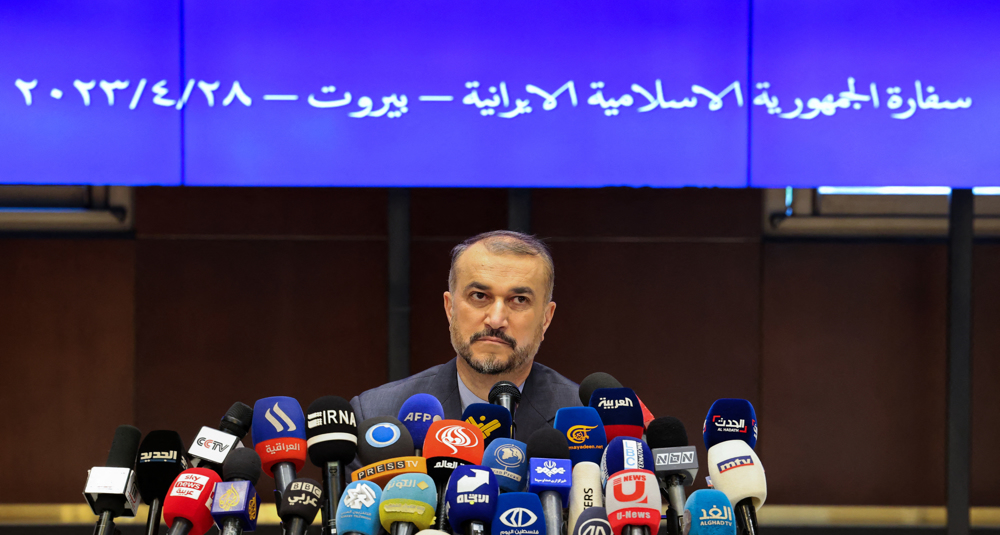Amir-Abdollahian: Iran can solve Lebanon’s electricity problem despite US bans
Foreign Minister Hossein Amir-Abdollahian says Iran can solve Lebanon’s electricity shortage problem through bilateral cooperation with the Arab country and in defiance of the already failed US sanctions.
Speaking at a press conference in Beirut on Friday, Amir-Abdollahian said he told Lebanese officials during his three-day visit that Iran can solve the issue provided that an agreement is reached between the two countries on joint cooperation.
“Of course, the US pressures and fearmongering about sanctions are among the problems in this regard, but you should know that the US sanctions have failed,” he said.
He hastened to add that Iran, which is under harsh US sanctions, exports electricity and oil to some countries, such as Iraq.
“Given Iran’s capabilities, [bilateral] cooperation in the electricity and gas sectors is a profitable and two-way business both for Lebanon and Iran, and of course, it helps to improve the Lebanese people’s welfare,” the top Iranian diplomat said.
Tehran and Beirut are advancing negotiations in this regard, Amir-Abdollahian said, expressing hope that the sides would be able to take practical steps after the completion of the political processes in Lebanon and the election of the country’s president.
Lebanon has been beset by a severe fuel crisis that has left many households and businesses struggling with recurrent power outages, while its economic meltdown since 2019 has slowed down imports of fuel for government plants.
Last year, Iran supplied much-needed fuel shipments to Lebanon via Syria after the Lebanese Hezbollah resistance movement asked for Iranian help to ease the energy shortage in the Arab country.
On Lebanon’s political problems, Amir-Abdollahian said Iran has always supported any agreement among the Lebanese parties and will make use of its capacities to help the Arab country complete its political process.
If all the Lebanese parties agreed on the election of a Christian president based on the country’s constitution, Iran would support the choice, the foreign minister added.
Tehran, Riyadh to reopen embassies ‘in coming days’
Elsewhere in his remarks, Amir-Abdollahian said Iran and Saudi Arabia will reopen their embassies and consulate generals in the coming days, almost two months after the two regional heavyweights agreed to normalize relations severed seven years earlier.
“During the last phone conversation between the Iranian and Saudi Arabian foreign ministers on Eid al-Fitr (April 21), we agreed to open our embassies and consulate generals in the two countries in the coming days,” he said.
The top Iranian diplomat noted that the resumption of relations between Iran and Saudi Arabia would lead to “positive” outcomes for regional countries, including Lebanon, and would open new chapters in ties among them.
He noted that before Eid al-Fitr, he extended an official invitation to Saudi Foreign Minister Faisal bin Farhan Al Saud to visit Tehran which was accepted by him.
The top Iranian diplomat further said that his Saudi counterpart has also invited him to pay an official visit to Riyadh, adding that “the time of the visits will be announced through diplomatic channels.”
After several days of intensive negotiations hosted by China, Iran and Saudi Arabia finally clinched a deal on March 10 to restore diplomatic relations and reopen embassies and missions within two months after seven years of estrangement.
Iran, Saudi Arabia and China also expressed their firm determination to make their utmost efforts to promote regional and international peace and security.
VIDEO | Yemenis praise the military for its successful operations against Israel
VIDEO | Israel continues to bomb Gaza homes
VIDEO | An insider's view of the country: Meybod City in Yazd
‘All wars have rules. All of those rules have been broken’ by Israel
VIDEO | Report flags India’s violation of rights of Rohingya detainees
Turkey's foreign minister meets Syria's de facto leader in Damascus
VIDEO | US Syria plots
'Next to impossible' to rescue patients from Gaza's Kamal Adwan Hospital: Director










 This makes it easy to access the Press TV website
This makes it easy to access the Press TV website